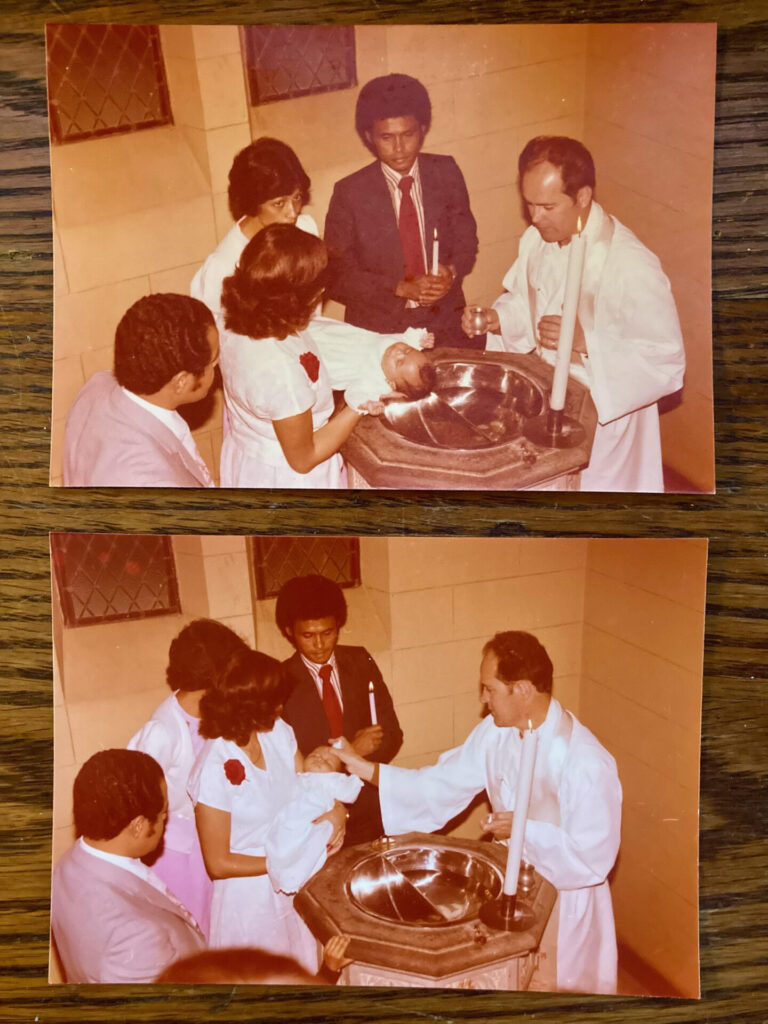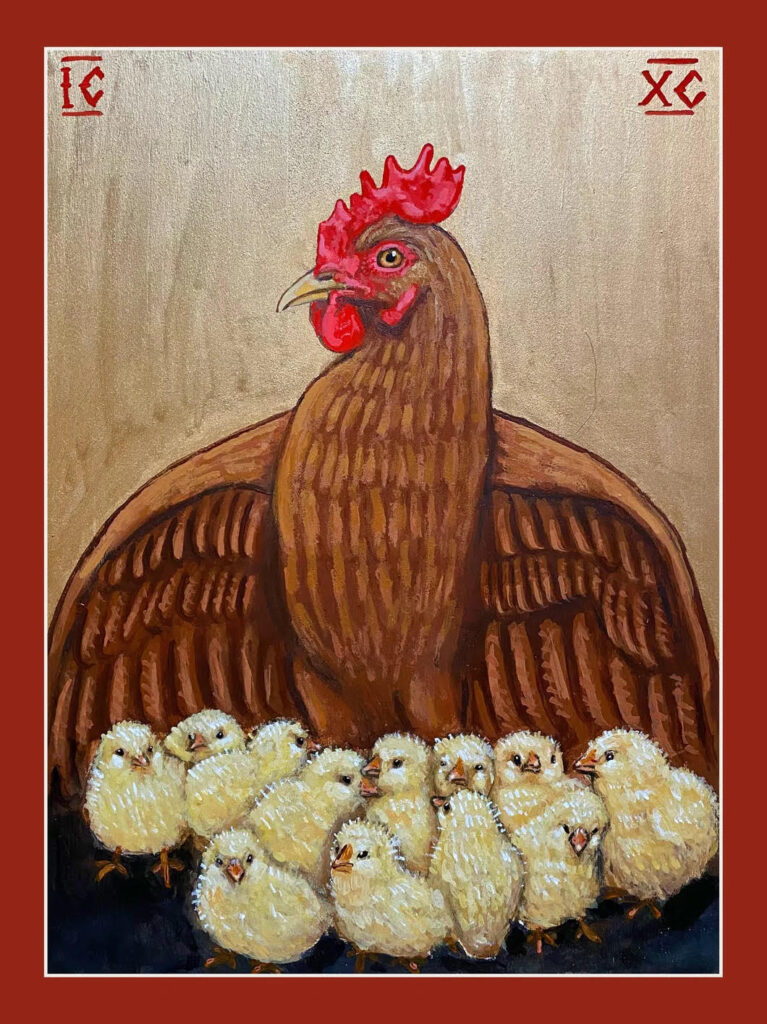by the Rev. Craig Lemming


In the name of Christ the Mother Hen, who broods over all God’s children. Amen.
This is the Fourth Sunday in Lent. Today is Laetare Sunday because the Latin Introit, “Laetare Jerusalem,” is traditionally chanted in the church today. The English translation of that Introit sings:
Rejoice, O Jerusalem: and come together all you that love her: sing with joy, you that have been in sorrow: that you may exult, and be filled from the breasts of God’s consolation.
This maternal image of being suckled, consoled, and nourished explains why this Fourth Sunday in Lent is called Mothering Sunday. Christians historically visited their mother church today – the church in which they received the sacrament of Holy Baptism. That is why you’ve received photographs of my Holy Baptism at the Catholic Cathedral in Harare, Zimbabwe. It looks like I had more hair back in 1982 than I do now! You see my handsome Catholic father sporting his magnificent Afro holding my baptismal candle; my beautiful Anglican mother with a red rose on her corsage holding me; my Catholic godmother Auntie Charmaine; my Anglican godfather Uncle John; and if you look closely, you’ll see my brother’s little hand reaching up and touching the baptismal font at which Fr. José Bairos, the Portuguese priest who baptized me, presides. A special word of love and gratitude to my mother who requested today’s opening hymn and who gave birth to me 42 years ago last Thursday.
Today’s sermon is about being God’s Holy Mother Church together – being people involved in the work of mothering and being mothered by a loving God and neighbors in Christ. I am aware that difficult relationships or painful memories can exist between mothers and children. And indeed, for some the church may have been a site of spiritual harm, not motherly love. If those realities are true for you, I hope, trust, and pray that you have been or will be blessed with adopted mothers or children; and that you will find God’s motherly love here in the people of St. John’s; since these gifts of chosen family and chosen faith community are sacred. We encounter this motherly love in Christ. In Luke’s Gospel, God’s motherly love is symbolized by Christ the Mother Hen. Kelly Latimore wrote this sacred icon on the other side of my Baptism photographs as a visual proclamation of Christ who longs for and desires to gather God’s children together as a hen gathers her brood under her wings.[i] That love oftentimes evades us, or we evade it.
In the words of the African-American Spiritual, “sometimes we feel like a motherless child, a long way from home.” So, on this Mothering Sunday, in the wake of International Women’s Day, during this Women’s History Month, as we ponder today’s Scriptures from A Women’s Lectionary, we give thanks for people who shared God’s motherly love with us, and made us feel at home, so that we can share that love with those who feel like motherless children a long way from home.
The widow mother’s jar of flour did not empty and her jug of oil did not decrease according to the Word of the Holy One that God spoke through Elijah.[ii] Our worldly ways make us terrified of scarcity. That fear of scarcity can make us understandably selfish. Today’s first lesson shows us how a mother widow trusts so fiercely in the promise of God’s providence that she makes what most of us would deem a reckless decision to show God’s motherly love to a stranger. The mother widow’s faithful trust is irrational. She only has a handful of flour and a drop of oil to make a small cake for her child and herself before they face dying in poverty. At that extremity of her and her child’s finitude she is put upon by the Prophet Elijah’s need for nourishment and shelter. The mother widow chooses to obey the Word of God as she extends extravagant hospitality to this strange prophet with no guarantee of survival. God’s motherly love, like the love of this mother widow, is an equation that does not balance. The mathematical formula of God’s motherly grace multiplies our small acts of trust in doing God’s will of love and the outcome is inexplicable abundance. The widow mother’s jar of flour did not empty and her jug of oil did not decrease according to the word of the Holy One that God spoke through Elijah. How are we to trust fiercely in sharing God’s motherly love? To obey God’s Word, in spite of the limitations put upon us, when the outcome of loving a stranger is unknown, this is the essence of faithfulness. How can we be more courageously vulnerable and believe in what today’s Psalm proclaims: “You open your hand, and satisfy the desire of every living thing”?
The gift of remembering stories of God’s motherly love may be one way to cultivate our trust in God’s abundant providence more faithfully. Remembering and sharing stories about the times we were mothered back to life help us live more grateful lives. In today’s Gospel, Jesus has to keep reminding the disciples, who are so obsessed with scarcity, that they are infected with amnesia. They keep forgetting how they have been provided for, nourished, filled, and consoled by God’s extravagant, motherly providence. Jesus says to them and to us:
And do you not remember? When I broke the five loaves for the five thousand men, how many baskets full of broken pieces did you collect?” They said to him, “Twelve.” “And the seven loaves for the four thousand women, children, and men, how many baskets full of broken pieces did you collect?” And they said to him, “Seven.” Then he said to them, “Do you not yet understand?”
So, I ask you, today, St. John’s, do you remember when the extravagant love of God mothered you back to life? Fed you? Comforted you? Taught you? Embraced all that you are unconditionally? Can you remember a story of how St. John’s has shared God’s motherly love with others? How have you joined God’s mothering Spirit in feeding, consoling, and nurturing others’ trust in the abundant life that is promised in Christ?
I can think of many ways mothering and being mothered has taken place for countless souls who cross our threshold or whose thresholds we have been blessed to cross. On this Mothering Sunday, we remember all who have sustained the loving ministries of Holy Mother Church over generations. It is up to each of us to remember them and to pass on their legacy of motherly love to those who come after us. The spiritual milk we learn about in today’s Epistle is produced through the faith, hope, and love that we practice as beloved children of God the Mother and Father of all peoples. Saint Paul teaches that from that nourishing spiritual milk, God produces growth; and that we are God’s coworkers, working together to do the reconciling love of Christ with our lives.
As our Lenten journey continues, our destination will be the renewal of our Baptismal Covenant at the Great Vigil of Easter, and celebrate a Holy Baptism. I encourage you to remember stories of God’s mothering love and share them with one another. Remember the ways God’s motherly spirit is seeking, serving, and loving through us; remember how God’s motherly love strives for justice and peace among all peoples through us; remember the ways God’s mothering love imbued you with sacred dignity so that you could see that sacred dignity in every fellow creature of God. On this Laetare and Mothering Sunday:
Rejoice, Mother Church: and come together all you that love her: sing with joy, you that have been in sorrow: that you may exult, and be filled from the breasts of God’s consolation.
May the blessing of the God of the Widow Mother and Elijah, of Jesus Christ born of our Mother Mary, and of the Holy Spirit, who broods over the world as a mother hen over her children, be upon us and remain with us always. Amen.
[i] Luke 13:34
[ii] 1 Kings 17:15

